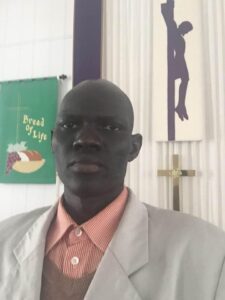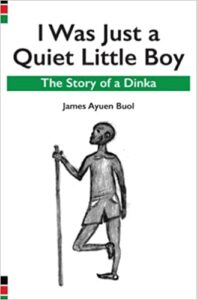James Buol has penned a remarkable account of his journey from his childhood in South Sudan to his life as an adult in Boston. His telling of his struggle is distinctive and compelling because of his candor and authenticity. His book, I Was Just a Quiet Little Boy, is written in the simple direct language of someone who learned English in refugee camps, without any fanfare or self-promotion. The book is written just as James told me his story in person.

His story indeed begins with his life as a quiet boy, living near the Nile river in South Sudan. But his family and his tribe are soon engulfed in cataclysmic events, beginning with a war between North and South Sudan. Readers will journey with him, as he and the others flee the wars in South Sudan, through the heartbreaking loss of family and friends, into refugee camps. He tells of his life in the camps, and the corruption of the UN, in his direct style. In 2014, James was selected for resettlement in the United States, and then relocated to the Boston area.
While James tells his story in a factual way, with an almost deadpan voice in person, it is remarkable for the extremes of human conduct that he experienced: the senseless cruelty of war and persecution, the corruption of the aid workers, and the compassion of those who helped him. James told me that wherever he was, he found a group of Christians who took him in and cared for him as if he were one of their family. These kindnesses often came at a high cost; the Anglican priest who baptized James and taught him the rudiments of the faith had both his hands cut off by Muslim soldiers from the north.

While he wrote his story in a factual way, it often elicits intense emotions from its readers. The pain and the horror that James and his tribe endured are effectively communicated by the simple narrative. Several members of my congregation cried while reading his book, others reported a profound sadness afterwards.
James has asked me and my congregation to help him with his book, by making it more freely available, promoting awareness of it, and encouraging people to read it. He hopes people will read his story, not to learn about his life, but rather to learn about the suffering of the Dinka people in South Sudan.
We have responded by helping to make the book available through the self-publishing service on Amazon. Interested readers can purchase either an ebook for their Kindle or a printed version.
What is not said in the book is as compelling as what is offered. How did James survive all of this horror to become a gentle man who loves to read and discuss the Bible with me?
What should one make of this little book, and what might someone do with it? It could be read to learn about an ancient culture half a world away, to learn about the human capacity for both cruelty and kindness, and most of all, to learn about the suffering of a noble people, the Dinka. It could be used by pastors to broaden the awareness of their young people beyond first world problems, or to aid in creating a greater understanding the persecution of Christians in Africa. It is a story of courage and persistence in the face of evil.
Pastor Charles Stevenson